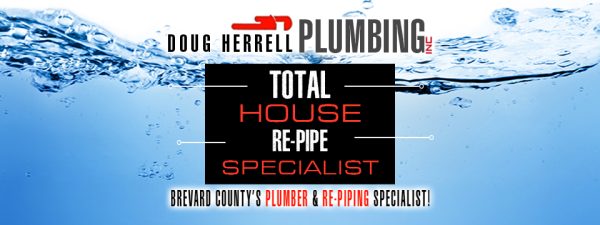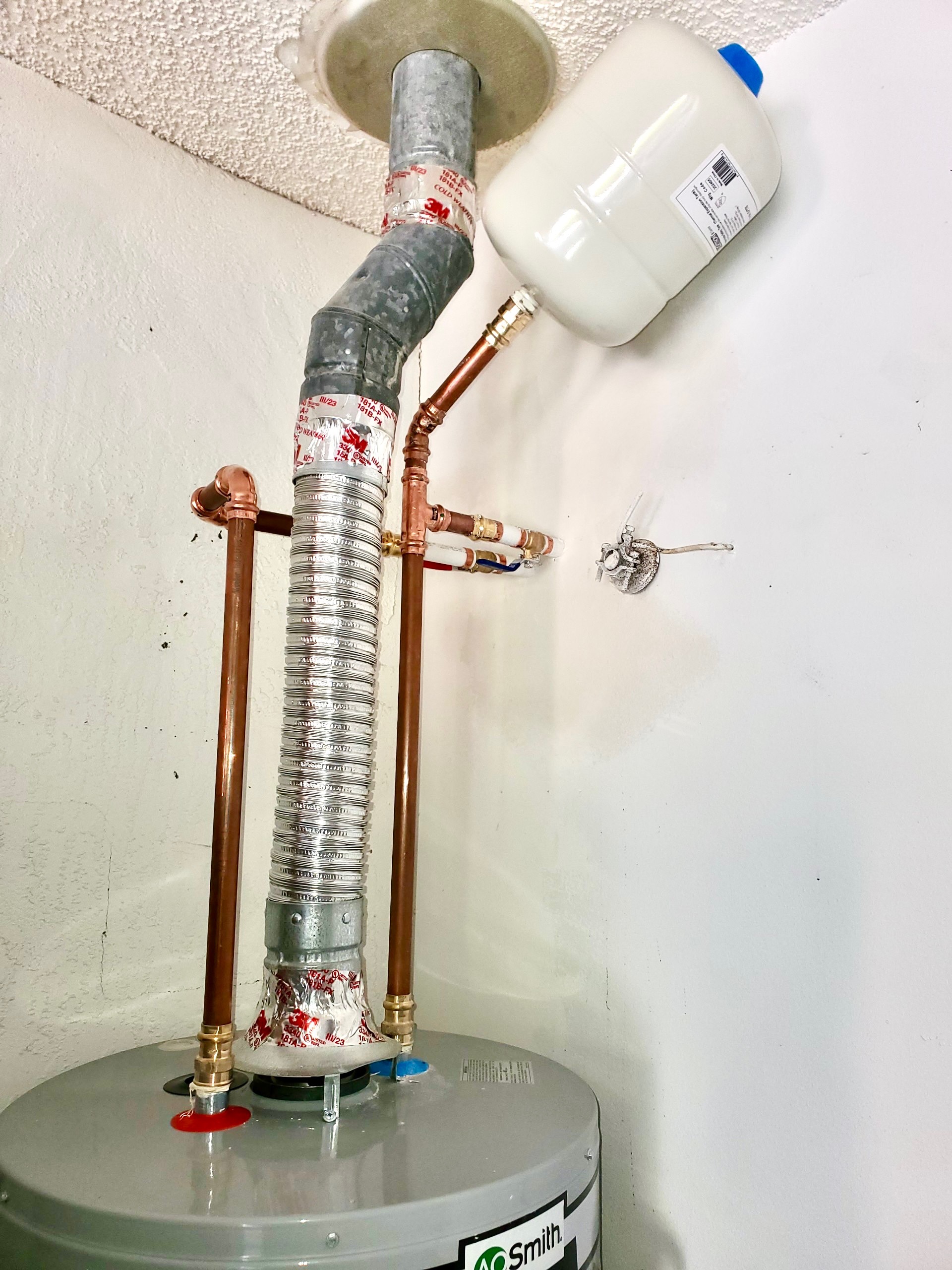
Doug Herrell Plumbing is the go to company for Brevard County Florida Slab Leak Detection.
Recognizing the signs of a concrete slab leak, also known as foundation leak, in your home can help prevent serious structural damage and costly repairs. Common indicators include unusually high water bills, damp or warm spots on your floor, the sound of running water when all fixtures are off, and even cracks in walls or floors. You might also notice mold growth or a persistent musty smell due to trapped moisture.
If you suspect a slab leak, a professional plumber can use specialized equipment, such as acoustic listening devices and infrared cameras, to detect the leak’s exact location without breaking into the slab. Once identified, there are various repair methods, including trenchless repair, rerouting the plumbing, spot repair, , or in severe cases, jackhammering to reach and replace the damaged section. Promptly addressing slab leaks can protect your home from further damage and keep your foundation strong.

Slab Leak Repair Methods
- Trenchless repair
- This method requires minor demolition and can fix a slab leak.
- Pipe rerouting or repiping
- This method involves installing new pipes around the edge of the slab or in the attic, while leaving the old pipes in place. It’s often more affordable than jackhammering through concrete.
- Spot repair
- This method involves removing a portion of the slab at the leak’s location and repairing the pipe. It’s often the most effective method for newer homes.
- Breaking out the slab
- This method involves jackhammering and removing the concrete floor to replace the pipes. It’s typically used as a last resort because it’s disruptive, expensive, messy, and noisy.
The best method for fixing a slab leak depends on the location, severity of the leak, and budget. If you believe you have a slab leak, Doug Herrell Plumbing is here to help.
Causes of Under Slab Plumbing Leaks
Knowing the causes of an under slab plumbing pipe leak can help you identify leaks before they do significant damage to your home and your wallet.
- Aging Pipes– If your pipes are near or at the end of their useful lives, you may start to experience small pinhole leaks.
- Corrosion– Acidic water can cause the premature corrosion of metal plumbing pipes, including copper.
- Excessively High Water Pressure– If you have abnormally high water pressure above 80psi, it can cause damage to your plumbing pipes, resulting in under slab leaks.
- Rubbing Against the Slab– If your pipes are against the underside of your foundation slab, they can rub against the concrete. Over time, this rubbing wears down the pipe wall, resulting in cracks and leaks.
- Shifting Soil– As your home settles and the earth beneath the home shifts, it can put pressure on your slab foundation and the pipes running under and through the slab, resulting in pipe cracks and breaks.
Here are common causes of a slab leak:
- Pipe Corrosion: Pipes under the slab can corrode over time due to chemical reactions between the metal and the soil or water, especially in areas with hard water or acidic soil.
- Abrasion: Pipes may rub against rough surfaces or other pipes as water flows, causing gradual wear and tear that can lead to leaks.
- Poor Installation: Pipes that were improperly installed or made of substandard materials may be more prone to leaks and other issues.
- Shifting Soil: Soil movement, often due to changes in moisture levels or earthquakes, can place stress on pipes under the slab, causing cracks or breaks.
- High Water Pressure: Excessive water pressure can stress pipes, leading to wear and leaks over time.
- Foundation Shifts or Settling: When the foundation settles or shifts due to soil changes, it can place additional pressure on pipes, causing leaks.
- Tree Root Intrusion: Roots from nearby trees can grow into the pipes or the slab itself, causing damage and leaks.
- Natural Wear and Aging: Over time, older pipes can simply wear out and develop leaks, especially if the home is decades old.
- Electrolysis: This occurs when different types of metals in contact with each other produce an electrical current, which can corrode pipes and lead to leaks.
- Vibrations and Ground Movements: Minor ground vibrations from traffic, construction, or other sources can also stress pipes, especially over a long period.
Regular inspections can help identify early signs of slab leaks, potentially preventing major damage.
Here are several common reasons someone might need to repipe their home:
- Frequent Leaks: Persistent leaks in multiple areas are often a sign that the plumbing system is deteriorating and needs replacement.
- Old or Outdated Piping: Homes with galvanized steel, polybutylene, or lead pipes, which are prone to corrosion, leaks, or health risks, often need repiping.
- Low Water Pressure: A noticeable drop in water pressure can indicate buildup inside aging pipes, restricting water flow and signaling the need for new pipes.
- Rusty or Discolored Water: Brown or rusty water, especially when first turned on, can indicate pipe corrosion that can affect water quality and damage fixtures.
- Water Temperature Fluctuations: Sudden changes in water temperature may indicate issues with the pipes or their connections.
- Noisy Pipes: Unusual sounds like banging or rattling, especially when turning on water, could suggest worn or improperly installed pipes needing replacement.
- Visible Corrosion or Rust: If visible sections of your pipes have rust or corrosion, it’s likely that hidden pipes are in similar or worse condition.
- Unpleasant Smells from Water: Foul odors coming from water could be due to bacteria buildup in old, corroded pipes, potentially affecting water safety.
- Foundation or Slab Leaks: If you have a slab leak or any underground pipe leak, it may be more efficient and economical to repipe than to keep repairing sections.
- Major Renovation or Remodel: When undergoing a major renovation, repiping can be a worthwhile investment to avoid future issues and add value to the property.
Repiping can improve water quality, increase pressure, and prevent future leaks, offering peace of mind and long-term savings.
See some of these signs? Contact Doug Herrell Plumbing at 321-254-0004.
If you’re unsure whether you’re in need of whole-home re-piping, we can help.
About Doug Herrell Plumbing
Doug Herrell Plumbing has been Brevard County’s source for plumbing services since 1980. We are a family owned and operated business and take tremendous pride in providing honest and reliable plumbing services at an affordable price.
CALL 321-254-0004!
Serving Melbourne, Palm Bay, Viera, Suntree, Titusville, Merritt Island, Melbourne Beach, Indialantic, Indian Harbour Beach, Cape Canaveral, Satellite Beach, Rockledge, West Melbourne, Cocoa, and Cocoa Beach.
continue reading


